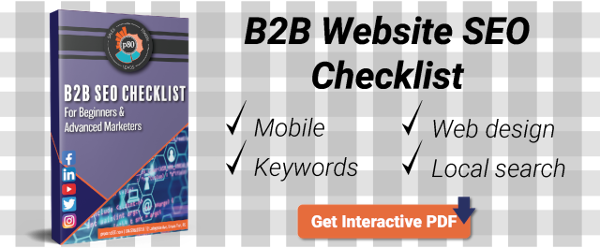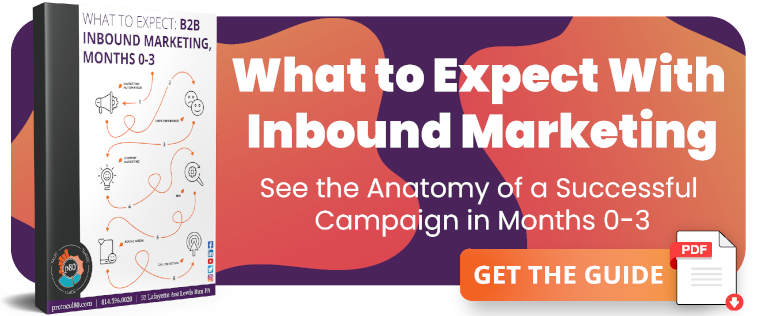Inbound Marketing Blog
for Manufacturers and Healthcare Companies
Business SEO Services: What Exactly Do You Get?

Ever bought one of those giant bags of chips that looks like it's about to explode with greasy, salty goodness?
Alas, when you tear open the bag, you find out 65% of it is ... air. Nothingness. A ruse. You're irritated, but you eat the chips anyway because you already spent the money. You move on with your life, and vow to never again be a sucker for the illusion of value.
 You may have heard similar sob stories (metaphorically speaking) about SEO for B2B companies. The good news is, if you educate yourself on what SEO work should look like and then partner with the right agency, there'll be nothing to get salty about.
You may have heard similar sob stories (metaphorically speaking) about SEO for B2B companies. The good news is, if you educate yourself on what SEO work should look like and then partner with the right agency, there'll be nothing to get salty about.
SEO, or search engine optimization, is a method of organically attracting more attention from potential buyers and Google search rankings. It's an awesome way to lower your B2B customer acquisition cost vs. pay-per-click advertising (PPC).
Assuming you're going to outsource SEO services instead of attempting the work in-house, let's set some proper expectations for the agency or freelancer experience.
What to Expect From Business SEO Services
Thanks to its compounding, non-interruptive nature, search optimization takes less investment to maintain over time than paid ads. Still, it's a workload and skill set you're not confident your marketing team can handle, so here you are researching business SEO services.
Maybe you've already attempted SEO yourself and didn't see any results. Maybe you've never done it before and want it done right the first time. Either way, you want to know what ROI you'll get from SEO marketing.
All SEO service providers are different. Some only offer SEO, some do search engine marketing (SEO and PPC), some offer content marketing with your SEO, and some do the full spectrum of inbound and content marketing (of which SEO is only one piece). Some agencies wear many industry hats, while others specialize in SEO for manufacturers or industrial companies. The range and specialization of services will help determine the agency's asking price.
(Related Resource: Why You Can't Afford Cheap SEO)
Your choice of provider will depend on how you want to grow and market your business. If you're looking at a long-term, fully integrated marketing plan, it can be more efficient to get all of your marketing services from one provider. If you're only dipping your toes in the SEO waters, you may find it more fitting to hire a specialized SEO company.
Either way, an SEO agency for B2B companies should offer these key services:
- Total site audit
- Industry & market research
- Keyword research
- Front- and back-end SEO
- On- and off-page SEO
- Mobile optimization
- Content marketing
- Local SEO
- Constant optimization
- Reporting that's consistent and transparent
1. Total Site Audit
A B2B search engine optimization agency should first perform a full site audit, which essentially gauges whether your website is SEO-friendly. This is a multi-step process that provides a starting point for your SEO. Here's what an audit consists of:
- Crawling your site
- Scanning for indexing issues
- Google Search Console setup
- Checking for duplicate pages and content
- Analyzing load times
- ID'ing pages with missing SEO tags (meta descriptions, alt text, etc.)
This audit will also identify any bits of code or pieces of content that are difficult for Google to read. If Google can't understand something on your site, it won't be indexed in the search engine.
2. Industry & Market Research
We industrial SEO service folks wouldn't be very useful if we jumped in blind. A good SEO provider will learn all about:
- Your company's products/services
- Its goals
- Where you fit in your industry
- Your target buyer's demographics, pain points, & alternative solutions
- How to make your SEO work for your specific needs.
This means the agency needs to know all about not just you, but also your "dream buyer" and your direct competitors. The state of your competitors' SEO can inform the agency how to get you to their level ... and eventually surpass them.
It's also helpful to understand your niches and special offerings, as these things can direct keyword research.
3. Keyword Research
Keyword research involves quite a bit of creativity. Your SEO provider needs to get into the heads of your best buyers and figure out what they're searching for and when. They'll need to figure out what keywords you're currently ranking for and which ones would be helpful to get on your radar.
Long-tail and short-tail keywords are both very important for business SEO, though long-tail keywords bring the most results for small-to-medium-sized businesses.
If you're doing Google Ads or other pay-per-click advertising along with your SEO, negative keywords are an absolute MUST. Negative keywords are terms that you choose to opt out of so your ads aren't shown for irrelevant terms. Search engine marketing is all about relevance.
4. Front- & Back-End SEO

"Going in through the front/back" in our industry refers to how you access a website. The front door is what your customers see: your homepage, navigation, etc. just as a regular Internet user will experience it. The back door is how you or your web dev will access the site to edit code or content. The back door is for site administrators only.
Front-end SEO means making changes that your customers will see. This includes editing content, changing the navigation, adding links, doing a redesign, etc. Google will understand some of this, but the main benefit comes from the user experience. Happier users means a lower bounce rate, higher session times, and more pages visited per session. These metrics affect your page ranking in Google.
Back-end SEO means making changes that only the search engine will look for (users can find some of these things, but the average user isn't interested). This means providing XML sitemaps, optimizing URLs, adding alt texts to images, optimizing titles and meta descriptions for pages and blog posts, etc. Google uses this information to help index your site and display it in relevant search results.
5. On- & Off-Page SEO
On-page SEO refers to the front and back end optimization above. These are things that you can control and easily tweak as needed. Off-page SEO is a lot more difficult.
Off-page SEO generally consists of inbound link building and social media marketing. Inbound link building means NOT buying, begging, bribing, or otherwise being shady to get links. Links should be grown organically - that means you need great content that other people want to link to. We'll talk about that more in the content marketing section.
6. Mobile Optimization

Searches from mobile devices often happen when the searcher needs information quickly away from their desk. A large portion of local searches are performed on mobile devices.
Also known as responsive design, a mobile-friendly website design can be a difference-maker. As in, the difference between making a connection due to that spontaneous need for information, and losing a potential customer due to your unoptimized website.
Any decent B2B or SaaS SEO agency will quickly be able to tell if your website is outdated and needs an upgrade from a mobile-performance standpoint.
7. Content Marketing
Content marketing is your powerhouse for building inbound links and social sharing (in other words, off-page SEO!). Some SEO agencies will provide content marketing with your SEO, or at least coach you to do it yourself.
Content marketing requires, first of all, high-quality, original content. No copy-and-paste from ChatGPT, no stealing from other people, no duplicating your own existing content. You need to create and share valuable, education-first information that's relevant to your buyer persona.
(Related Resource: Can Anyone Write Marketing Content? Nope.)
Your high-quality original content should also be optimized for SEO. That means proper usage of keywords in titles, headings, content, image alt text, etc. It also means using media that Google can understand, and that won't slow down your site.
Further, you should be producing high-quality original content on a regular basis. Somewhere between daily and weekly is best, though monthly will do if you really don't have a lot of time. If your SEO agency offers this service, you won't have to worry about writing or publishing content on time.
8. Local Listing Optimization
Local listings are incredibly important for businesses that are small or have a lot of walk-in traffic. If that's you, most of your business is likely coming from your state and the closest adjacent states. The people who live in and visit those areas need to be able to find you in search results.
When people do specific local searches (e.g. "insurance providers in Rochester, NY"), they're more likely to take action and make a purchase decision than non-location-based searches. Local searchers are often looking for contact information, physical addresses, hours, and product availability.
For some more info on optimizing your local reach, check out this blog post on SEO for small business.
9. Constant Optimization
To bring it back (rather poorly) to the original chip analogy: Once you pop, you can't stop.
Did you know Google's algorithms and ranking criteria change hundreds of times a year? Many SEO experts believe Google makes changes multiple times a day, though Google only admits to 300-400 changes annually. For the most part, these changes are tiny and unnoticeable. However, Google announces big changes a few times a year, often with massive implications for how you should attack SEO.
An expert SEO services provider will be up to date on the latest algorithms, and will be watching for ranking dips that can indicate a new algorithm change. Part of our job is catching those dips before they become a real issue (rankings constantly fluctuate due to a number of factors - a small dip is nothing to worry about) and making changes to balance them out.
Your SEO agency is dedicated to you. They'll be constantly looking for ways to improve SEO: ranking opportunities, link-building opportunities, A/B testing, and anything else that can make your site rank higher in Google.
10. Reporting That's Consistent & Transparent
This is the issue clients cite the most when telling us why they broke up with a prior agency. We're paraphrasing, but it usually sounds like one of these:
- "The agency would disappear for weeks at a time, and reporting wasn't consistent."
- "Their data was very surface-level, and they weren't very forthcoming with numbers."
- "There didn't seem to be any strategy behind what they were doing."
That, good sir or madam, is insane. Please don't ever hire B2B SEO "experts" that can't tell you the methods behind their madness.
In our experience, most clients prefer bi-weekly or monthly reporting. Of course, "frequent" means different things to different people. Some happy businesses are so hands-off with SEO that they only want reports on a yearly basis!
The frequency of the reports, and the key performance indicators included, should be up to you. if you ask for weekly reports, your SEO agency should be able to provide them. If they refuse for any reason, well, that's just poor customer service.
Sounds Expensive. Is It?
It might seem that way at first. But is it any more expensive than throwing money at Google Ads, which stop producing results the second you turn them off? B2B SEO consulting is a long-term investment. If you stick to the right plan, it'll more than pay for itself in the next 1-2 years.
Many areas of digital marketing tie into SEO, so here are some more specific pricing resources to help you grasp the undertaking:
The Best Business SEO Services Are Inbound Services
Search engine optimization can help you increase brand awareness and bring in more leads – if your professional SEO firm has the right (aka inbound) mindset. There aren't really any SEO solutions in 2025 that don't involve inbound marketing, and vice versa. If your agency uses them symbiotically, they'll work – period. (We know because we use inbound and SEO content for our own marketing.)
Want to know more about how an SEO and inbound service plan works from month to month? Visit our free "what to expect" resource below:
(Editor's note: This blog post was originally published in May 2016 and was recently updated with modern insights.)
Our Blogs, Direct to Your Inbox!
How to Audit your Online Marketing
If you are executing digital marketing, congratulations! You are most likely already one step ahead of your competition, and making strides to meaningfully connect with prospects online. But, how do you know if you’re seeing continual success year over year, and improving your metrics?
Without the tools in place to analyze and benchmark your efforts, it is impossible to scale your online marketing and ensure continuous success.



